Legal Responses to Mental Health and Drug Services in Victoria
VerifiedAdded on 2021/05/31
|6
|1401
|40
Report
AI Summary
This report provides an overview of the Victorian government's approach to mental health and alcohol and other drug services. It highlights key policies, legal responses, and funding initiatives aimed at managing and reducing the prevalence of mental health issues and substance abuse. The report focuses on the Mental Health Act 2014, emphasizing its role in empowering individuals, promoting participation in decision-making, and ensuring the protection of rights. It also details the government's support for alcohol and drug treatment, including service standards, pharmacotherapy, and research funding to address changing drug use patterns. The analysis covers the government's commitment to working with users, families, and caregivers to improve outcomes, as well as the implementation of campaigns and treatment programs. The report concludes that the legal responses have been beneficial and will continue to assist individuals with mental illness and substance abuse.
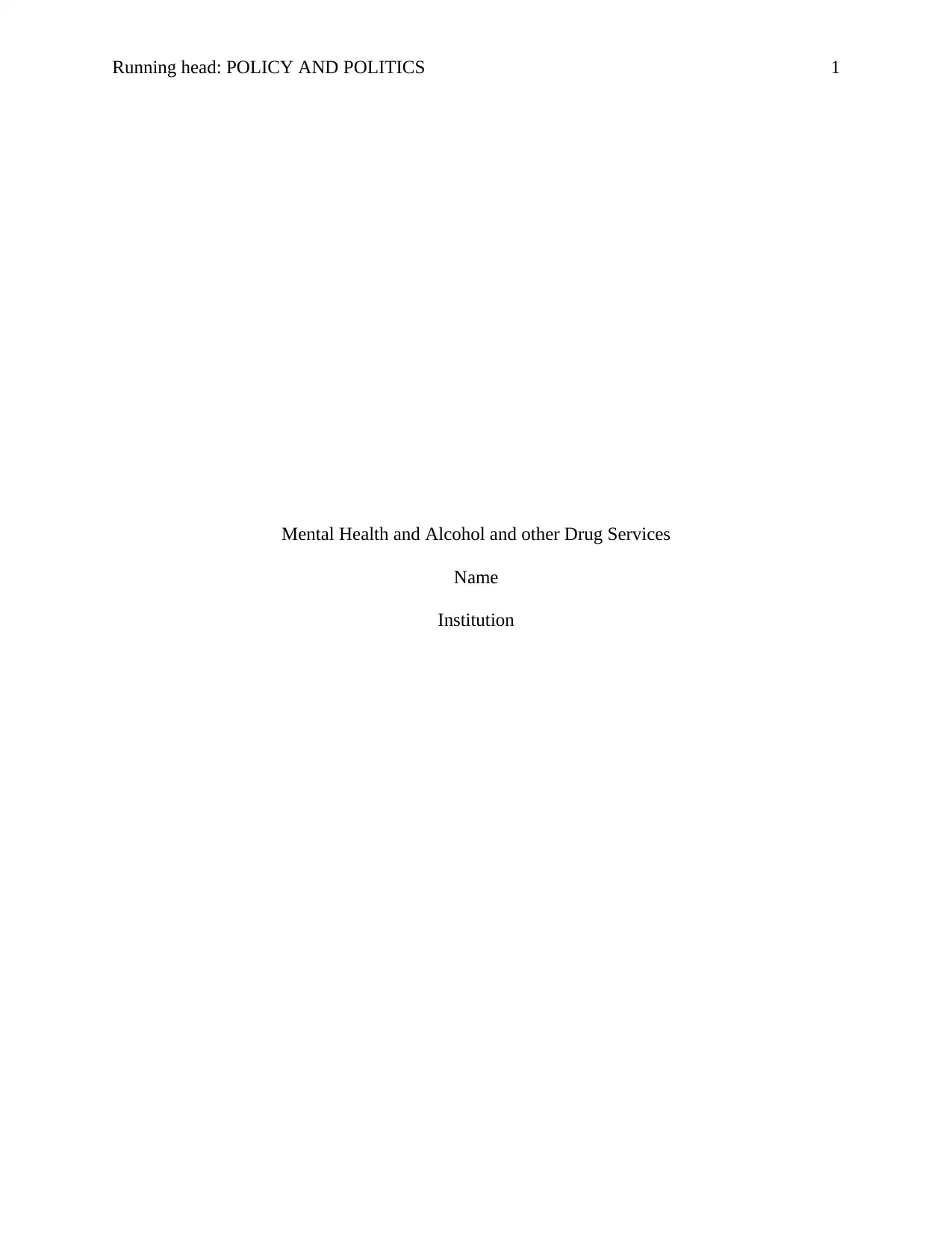
Running head: POLICY AND POLITICS 1
Mental Health and Alcohol and other Drug Services
Name
Institution
Mental Health and Alcohol and other Drug Services
Name
Institution
Paraphrase This Document
Need a fresh take? Get an instant paraphrase of this document with our AI Paraphraser
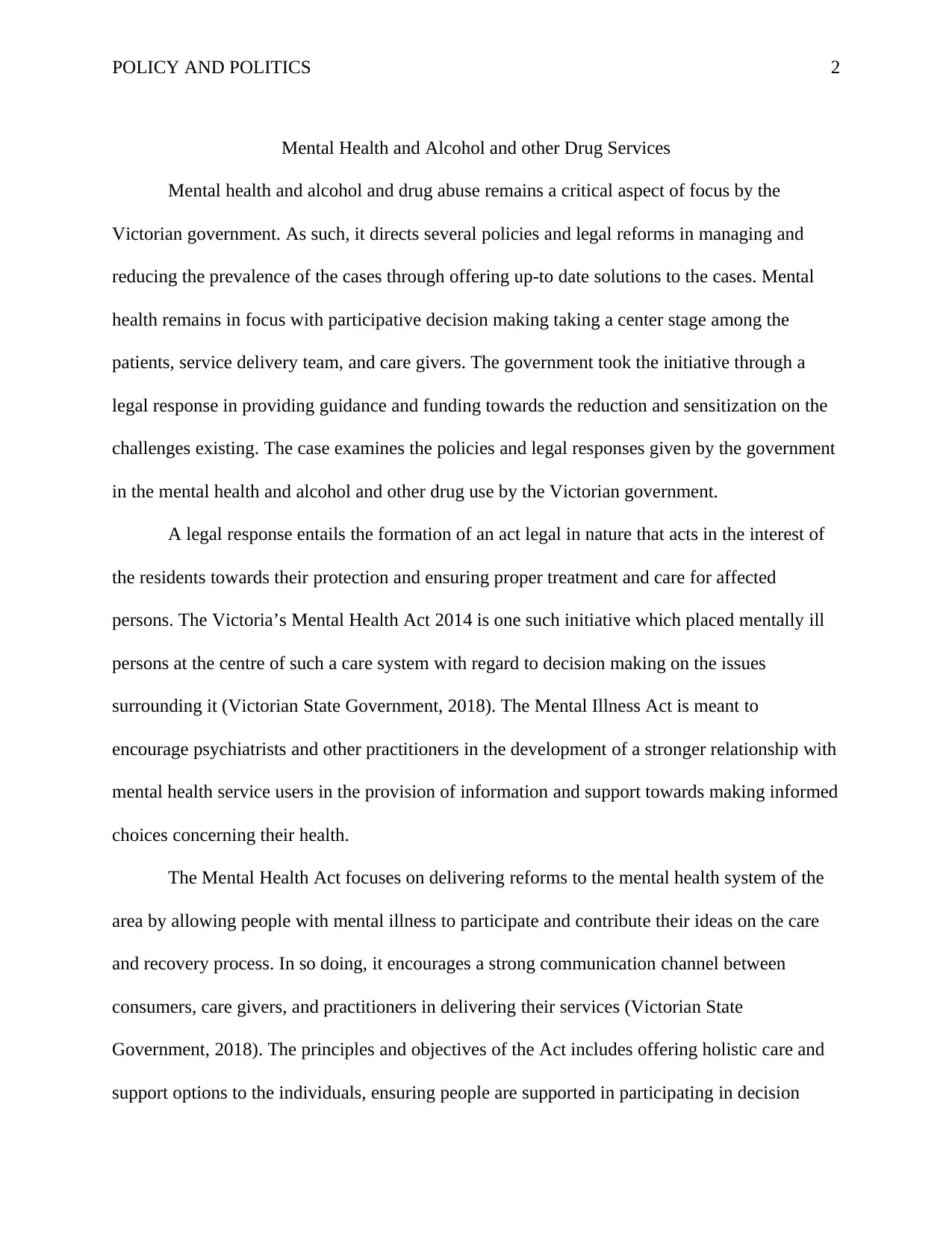
POLICY AND POLITICS 2
Mental Health and Alcohol and other Drug Services
Mental health and alcohol and drug abuse remains a critical aspect of focus by the
Victorian government. As such, it directs several policies and legal reforms in managing and
reducing the prevalence of the cases through offering up-to date solutions to the cases. Mental
health remains in focus with participative decision making taking a center stage among the
patients, service delivery team, and care givers. The government took the initiative through a
legal response in providing guidance and funding towards the reduction and sensitization on the
challenges existing. The case examines the policies and legal responses given by the government
in the mental health and alcohol and other drug use by the Victorian government.
A legal response entails the formation of an act legal in nature that acts in the interest of
the residents towards their protection and ensuring proper treatment and care for affected
persons. The Victoria’s Mental Health Act 2014 is one such initiative which placed mentally ill
persons at the centre of such a care system with regard to decision making on the issues
surrounding it (Victorian State Government, 2018). The Mental Illness Act is meant to
encourage psychiatrists and other practitioners in the development of a stronger relationship with
mental health service users in the provision of information and support towards making informed
choices concerning their health.
The Mental Health Act focuses on delivering reforms to the mental health system of the
area by allowing people with mental illness to participate and contribute their ideas on the care
and recovery process. In so doing, it encourages a strong communication channel between
consumers, care givers, and practitioners in delivering their services (Victorian State
Government, 2018). The principles and objectives of the Act includes offering holistic care and
support options to the individuals, ensuring people are supported in participating in decision
Mental Health and Alcohol and other Drug Services
Mental health and alcohol and drug abuse remains a critical aspect of focus by the
Victorian government. As such, it directs several policies and legal reforms in managing and
reducing the prevalence of the cases through offering up-to date solutions to the cases. Mental
health remains in focus with participative decision making taking a center stage among the
patients, service delivery team, and care givers. The government took the initiative through a
legal response in providing guidance and funding towards the reduction and sensitization on the
challenges existing. The case examines the policies and legal responses given by the government
in the mental health and alcohol and other drug use by the Victorian government.
A legal response entails the formation of an act legal in nature that acts in the interest of
the residents towards their protection and ensuring proper treatment and care for affected
persons. The Victoria’s Mental Health Act 2014 is one such initiative which placed mentally ill
persons at the centre of such a care system with regard to decision making on the issues
surrounding it (Victorian State Government, 2018). The Mental Illness Act is meant to
encourage psychiatrists and other practitioners in the development of a stronger relationship with
mental health service users in the provision of information and support towards making informed
choices concerning their health.
The Mental Health Act focuses on delivering reforms to the mental health system of the
area by allowing people with mental illness to participate and contribute their ideas on the care
and recovery process. In so doing, it encourages a strong communication channel between
consumers, care givers, and practitioners in delivering their services (Victorian State
Government, 2018). The principles and objectives of the Act includes offering holistic care and
support options to the individuals, ensuring people are supported in participating in decision
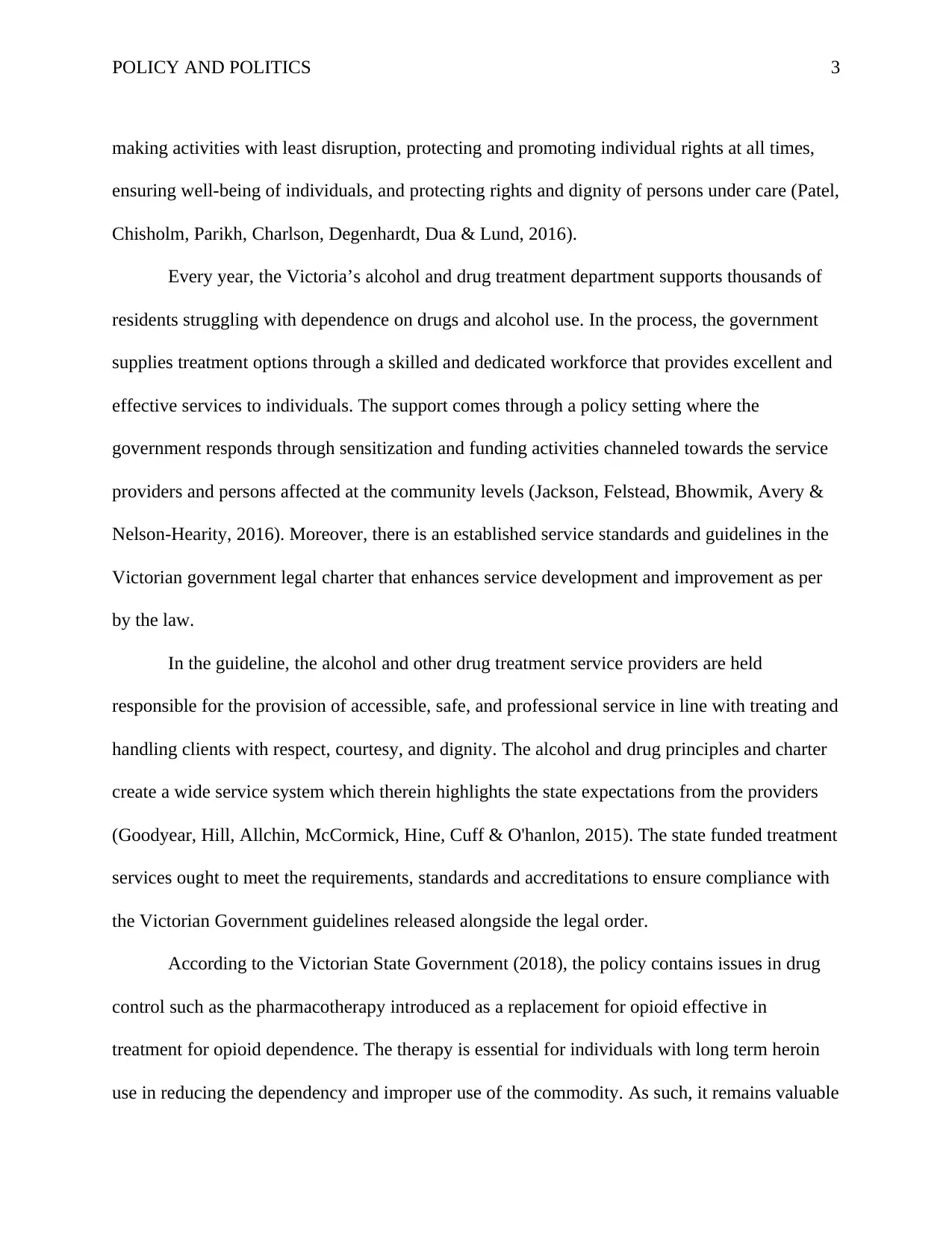
POLICY AND POLITICS 3
making activities with least disruption, protecting and promoting individual rights at all times,
ensuring well-being of individuals, and protecting rights and dignity of persons under care (Patel,
Chisholm, Parikh, Charlson, Degenhardt, Dua & Lund, 2016).
Every year, the Victoria’s alcohol and drug treatment department supports thousands of
residents struggling with dependence on drugs and alcohol use. In the process, the government
supplies treatment options through a skilled and dedicated workforce that provides excellent and
effective services to individuals. The support comes through a policy setting where the
government responds through sensitization and funding activities channeled towards the service
providers and persons affected at the community levels (Jackson, Felstead, Bhowmik, Avery &
Nelson-Hearity, 2016). Moreover, there is an established service standards and guidelines in the
Victorian government legal charter that enhances service development and improvement as per
by the law.
In the guideline, the alcohol and other drug treatment service providers are held
responsible for the provision of accessible, safe, and professional service in line with treating and
handling clients with respect, courtesy, and dignity. The alcohol and drug principles and charter
create a wide service system which therein highlights the state expectations from the providers
(Goodyear, Hill, Allchin, McCormick, Hine, Cuff & O'hanlon, 2015). The state funded treatment
services ought to meet the requirements, standards and accreditations to ensure compliance with
the Victorian Government guidelines released alongside the legal order.
According to the Victorian State Government (2018), the policy contains issues in drug
control such as the pharmacotherapy introduced as a replacement for opioid effective in
treatment for opioid dependence. The therapy is essential for individuals with long term heroin
use in reducing the dependency and improper use of the commodity. As such, it remains valuable
making activities with least disruption, protecting and promoting individual rights at all times,
ensuring well-being of individuals, and protecting rights and dignity of persons under care (Patel,
Chisholm, Parikh, Charlson, Degenhardt, Dua & Lund, 2016).
Every year, the Victoria’s alcohol and drug treatment department supports thousands of
residents struggling with dependence on drugs and alcohol use. In the process, the government
supplies treatment options through a skilled and dedicated workforce that provides excellent and
effective services to individuals. The support comes through a policy setting where the
government responds through sensitization and funding activities channeled towards the service
providers and persons affected at the community levels (Jackson, Felstead, Bhowmik, Avery &
Nelson-Hearity, 2016). Moreover, there is an established service standards and guidelines in the
Victorian government legal charter that enhances service development and improvement as per
by the law.
In the guideline, the alcohol and other drug treatment service providers are held
responsible for the provision of accessible, safe, and professional service in line with treating and
handling clients with respect, courtesy, and dignity. The alcohol and drug principles and charter
create a wide service system which therein highlights the state expectations from the providers
(Goodyear, Hill, Allchin, McCormick, Hine, Cuff & O'hanlon, 2015). The state funded treatment
services ought to meet the requirements, standards and accreditations to ensure compliance with
the Victorian Government guidelines released alongside the legal order.
According to the Victorian State Government (2018), the policy contains issues in drug
control such as the pharmacotherapy introduced as a replacement for opioid effective in
treatment for opioid dependence. The therapy is essential for individuals with long term heroin
use in reducing the dependency and improper use of the commodity. As such, it remains valuable
⊘ This is a preview!⊘
Do you want full access?
Subscribe today to unlock all pages.

Trusted by 1+ million students worldwide
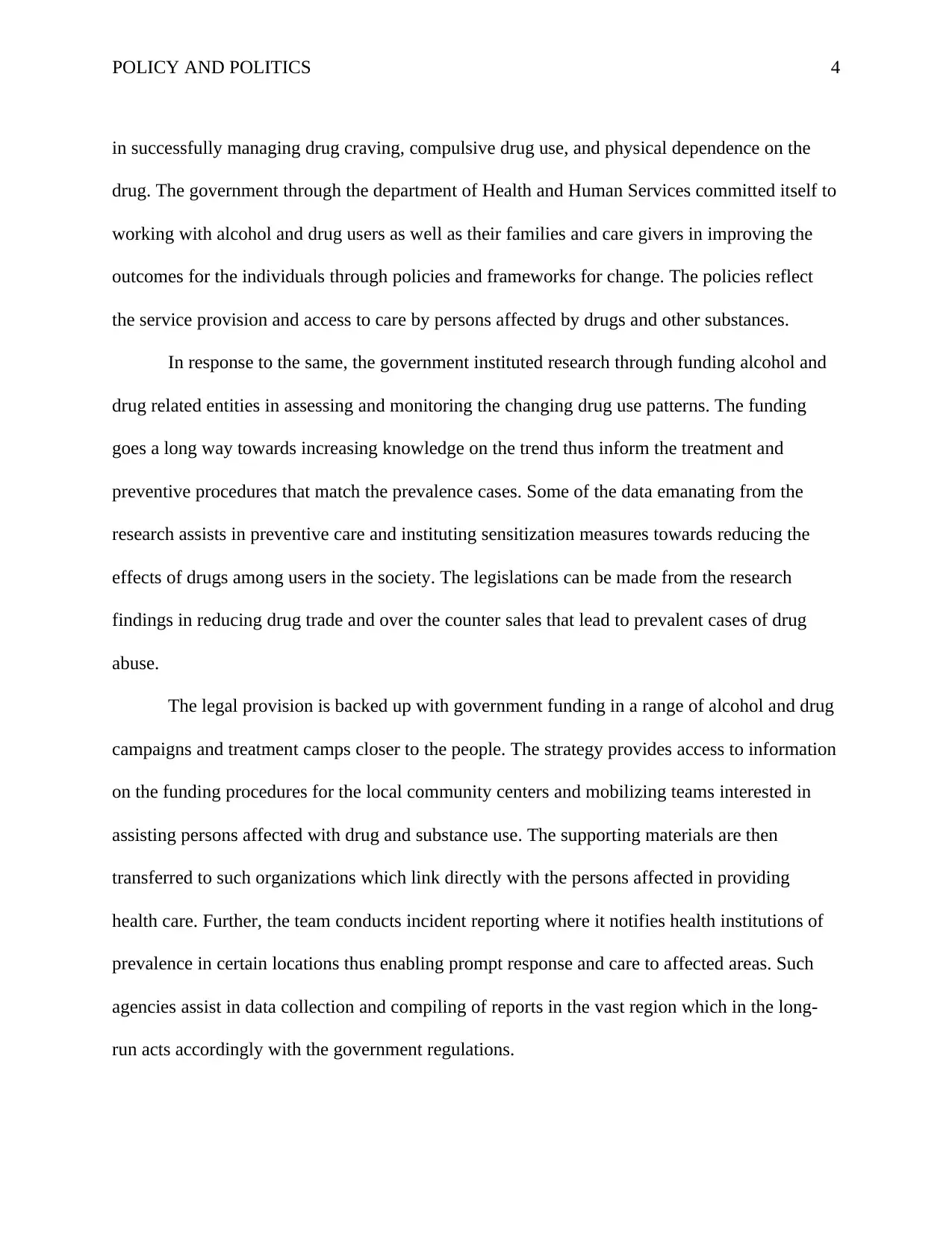
POLICY AND POLITICS 4
in successfully managing drug craving, compulsive drug use, and physical dependence on the
drug. The government through the department of Health and Human Services committed itself to
working with alcohol and drug users as well as their families and care givers in improving the
outcomes for the individuals through policies and frameworks for change. The policies reflect
the service provision and access to care by persons affected by drugs and other substances.
In response to the same, the government instituted research through funding alcohol and
drug related entities in assessing and monitoring the changing drug use patterns. The funding
goes a long way towards increasing knowledge on the trend thus inform the treatment and
preventive procedures that match the prevalence cases. Some of the data emanating from the
research assists in preventive care and instituting sensitization measures towards reducing the
effects of drugs among users in the society. The legislations can be made from the research
findings in reducing drug trade and over the counter sales that lead to prevalent cases of drug
abuse.
The legal provision is backed up with government funding in a range of alcohol and drug
campaigns and treatment camps closer to the people. The strategy provides access to information
on the funding procedures for the local community centers and mobilizing teams interested in
assisting persons affected with drug and substance use. The supporting materials are then
transferred to such organizations which link directly with the persons affected in providing
health care. Further, the team conducts incident reporting where it notifies health institutions of
prevalence in certain locations thus enabling prompt response and care to affected areas. Such
agencies assist in data collection and compiling of reports in the vast region which in the long-
run acts accordingly with the government regulations.
in successfully managing drug craving, compulsive drug use, and physical dependence on the
drug. The government through the department of Health and Human Services committed itself to
working with alcohol and drug users as well as their families and care givers in improving the
outcomes for the individuals through policies and frameworks for change. The policies reflect
the service provision and access to care by persons affected by drugs and other substances.
In response to the same, the government instituted research through funding alcohol and
drug related entities in assessing and monitoring the changing drug use patterns. The funding
goes a long way towards increasing knowledge on the trend thus inform the treatment and
preventive procedures that match the prevalence cases. Some of the data emanating from the
research assists in preventive care and instituting sensitization measures towards reducing the
effects of drugs among users in the society. The legislations can be made from the research
findings in reducing drug trade and over the counter sales that lead to prevalent cases of drug
abuse.
The legal provision is backed up with government funding in a range of alcohol and drug
campaigns and treatment camps closer to the people. The strategy provides access to information
on the funding procedures for the local community centers and mobilizing teams interested in
assisting persons affected with drug and substance use. The supporting materials are then
transferred to such organizations which link directly with the persons affected in providing
health care. Further, the team conducts incident reporting where it notifies health institutions of
prevalence in certain locations thus enabling prompt response and care to affected areas. Such
agencies assist in data collection and compiling of reports in the vast region which in the long-
run acts accordingly with the government regulations.
Paraphrase This Document
Need a fresh take? Get an instant paraphrase of this document with our AI Paraphraser
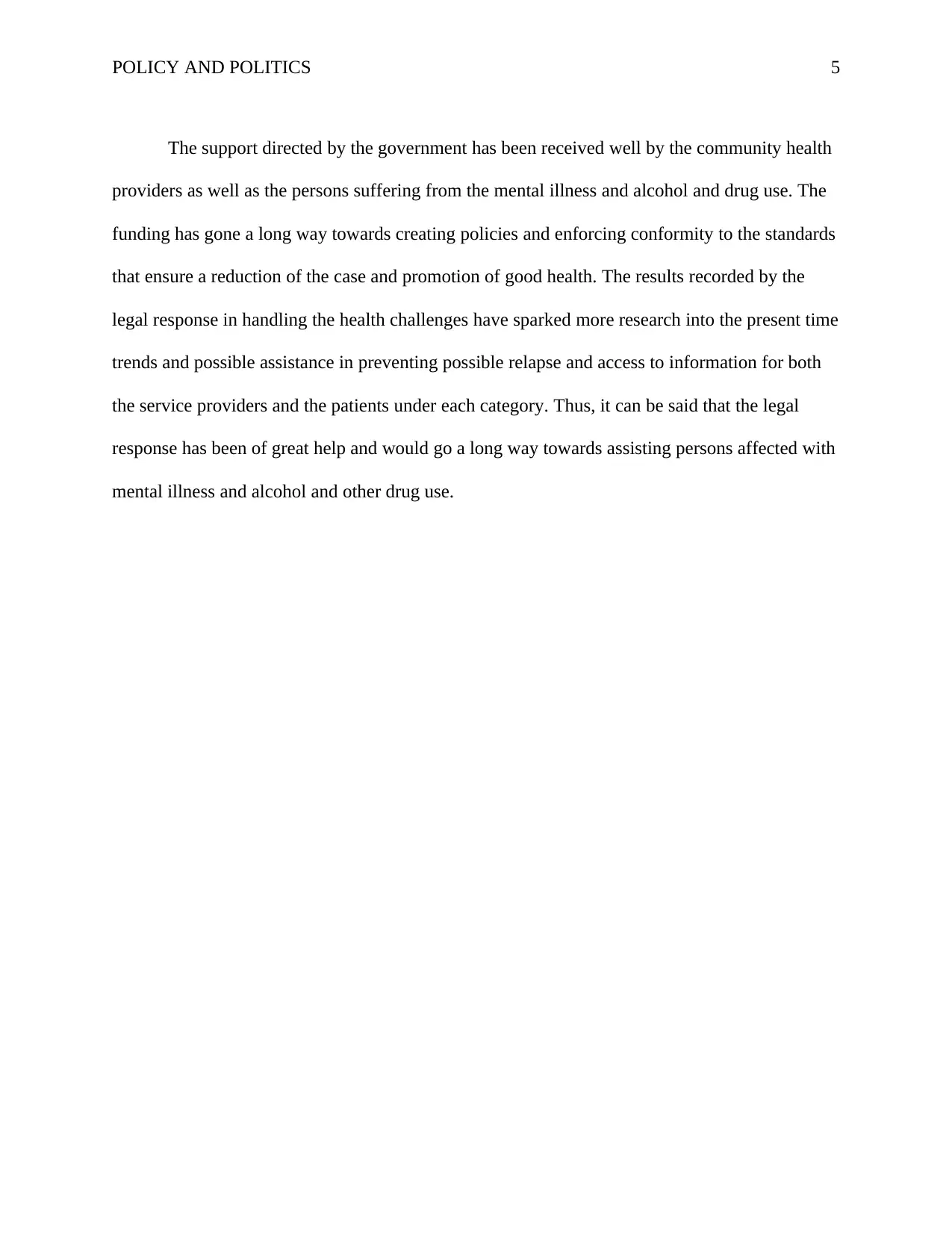
POLICY AND POLITICS 5
The support directed by the government has been received well by the community health
providers as well as the persons suffering from the mental illness and alcohol and drug use. The
funding has gone a long way towards creating policies and enforcing conformity to the standards
that ensure a reduction of the case and promotion of good health. The results recorded by the
legal response in handling the health challenges have sparked more research into the present time
trends and possible assistance in preventing possible relapse and access to information for both
the service providers and the patients under each category. Thus, it can be said that the legal
response has been of great help and would go a long way towards assisting persons affected with
mental illness and alcohol and other drug use.
The support directed by the government has been received well by the community health
providers as well as the persons suffering from the mental illness and alcohol and drug use. The
funding has gone a long way towards creating policies and enforcing conformity to the standards
that ensure a reduction of the case and promotion of good health. The results recorded by the
legal response in handling the health challenges have sparked more research into the present time
trends and possible assistance in preventing possible relapse and access to information for both
the service providers and the patients under each category. Thus, it can be said that the legal
response has been of great help and would go a long way towards assisting persons affected with
mental illness and alcohol and other drug use.
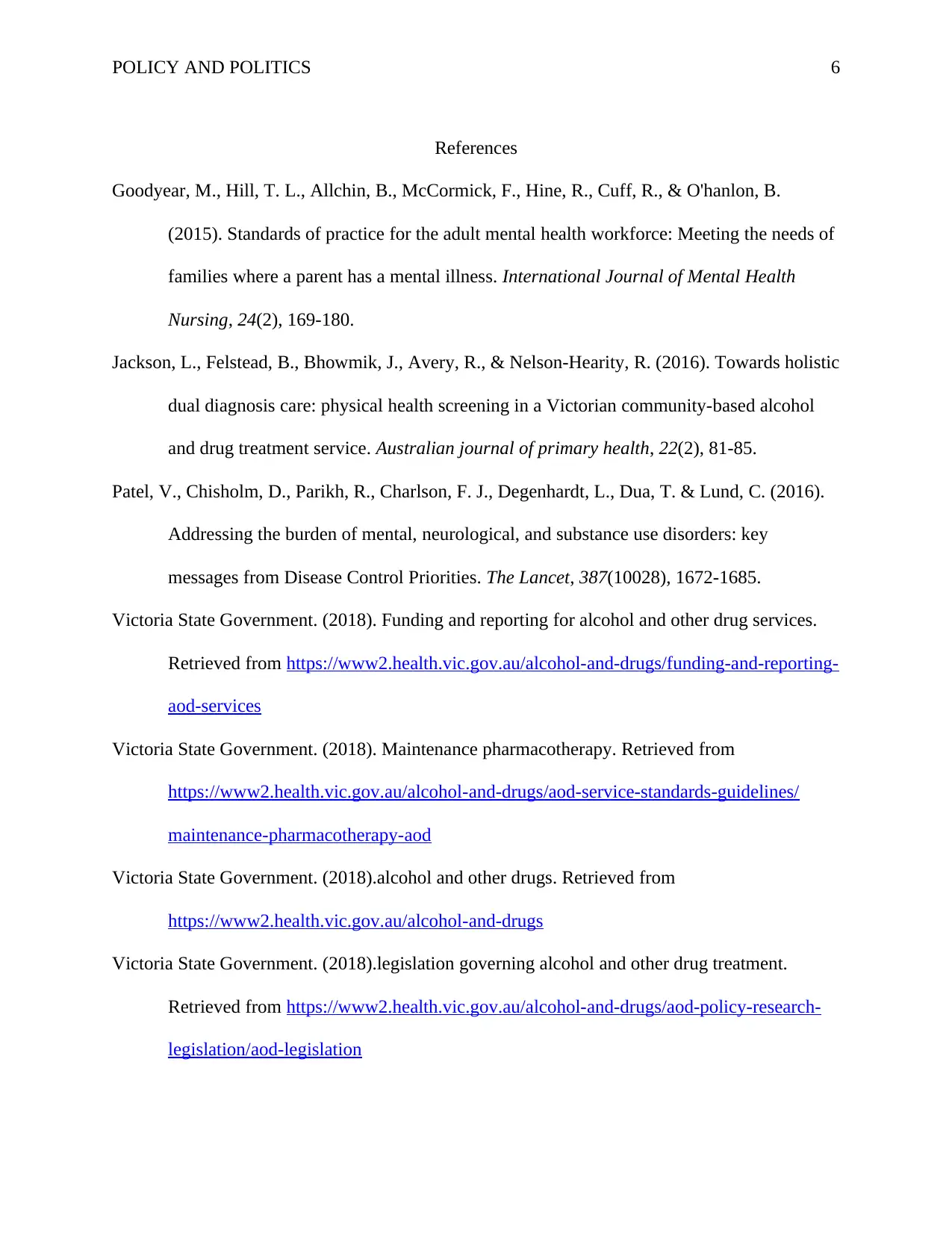
POLICY AND POLITICS 6
References
Goodyear, M., Hill, T. L., Allchin, B., McCormick, F., Hine, R., Cuff, R., & O'hanlon, B.
(2015). Standards of practice for the adult mental health workforce: Meeting the needs of
families where a parent has a mental illness. International Journal of Mental Health
Nursing, 24(2), 169-180.
Jackson, L., Felstead, B., Bhowmik, J., Avery, R., & Nelson-Hearity, R. (2016). Towards holistic
dual diagnosis care: physical health screening in a Victorian community-based alcohol
and drug treatment service. Australian journal of primary health, 22(2), 81-85.
Patel, V., Chisholm, D., Parikh, R., Charlson, F. J., Degenhardt, L., Dua, T. & Lund, C. (2016).
Addressing the burden of mental, neurological, and substance use disorders: key
messages from Disease Control Priorities. The Lancet, 387(10028), 1672-1685.
Victoria State Government. (2018). Funding and reporting for alcohol and other drug services.
Retrieved from https://www2.health.vic.gov.au/alcohol-and-drugs/funding-and-reporting-
aod-services
Victoria State Government. (2018). Maintenance pharmacotherapy. Retrieved from
https://www2.health.vic.gov.au/alcohol-and-drugs/aod-service-standards-guidelines/
maintenance-pharmacotherapy-aod
Victoria State Government. (2018).alcohol and other drugs. Retrieved from
https://www2.health.vic.gov.au/alcohol-and-drugs
Victoria State Government. (2018).legislation governing alcohol and other drug treatment.
Retrieved from https://www2.health.vic.gov.au/alcohol-and-drugs/aod-policy-research-
legislation/aod-legislation
References
Goodyear, M., Hill, T. L., Allchin, B., McCormick, F., Hine, R., Cuff, R., & O'hanlon, B.
(2015). Standards of practice for the adult mental health workforce: Meeting the needs of
families where a parent has a mental illness. International Journal of Mental Health
Nursing, 24(2), 169-180.
Jackson, L., Felstead, B., Bhowmik, J., Avery, R., & Nelson-Hearity, R. (2016). Towards holistic
dual diagnosis care: physical health screening in a Victorian community-based alcohol
and drug treatment service. Australian journal of primary health, 22(2), 81-85.
Patel, V., Chisholm, D., Parikh, R., Charlson, F. J., Degenhardt, L., Dua, T. & Lund, C. (2016).
Addressing the burden of mental, neurological, and substance use disorders: key
messages from Disease Control Priorities. The Lancet, 387(10028), 1672-1685.
Victoria State Government. (2018). Funding and reporting for alcohol and other drug services.
Retrieved from https://www2.health.vic.gov.au/alcohol-and-drugs/funding-and-reporting-
aod-services
Victoria State Government. (2018). Maintenance pharmacotherapy. Retrieved from
https://www2.health.vic.gov.au/alcohol-and-drugs/aod-service-standards-guidelines/
maintenance-pharmacotherapy-aod
Victoria State Government. (2018).alcohol and other drugs. Retrieved from
https://www2.health.vic.gov.au/alcohol-and-drugs
Victoria State Government. (2018).legislation governing alcohol and other drug treatment.
Retrieved from https://www2.health.vic.gov.au/alcohol-and-drugs/aod-policy-research-
legislation/aod-legislation
⊘ This is a preview!⊘
Do you want full access?
Subscribe today to unlock all pages.

Trusted by 1+ million students worldwide
1 out of 6
Related Documents
Your All-in-One AI-Powered Toolkit for Academic Success.
+13062052269
info@desklib.com
Available 24*7 on WhatsApp / Email
![[object Object]](/_next/static/media/star-bottom.7253800d.svg)
Unlock your academic potential
Copyright © 2020–2026 A2Z Services. All Rights Reserved. Developed and managed by ZUCOL.





